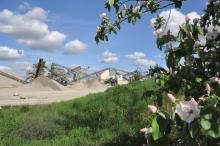The UEPG (European Aggregates Association) says that now more than ever aggregates producers need to make their voices heard in the EU corridors of power in Brussels, with membership of the Association providing a crucial platform for their views.
The European aggregates industry is a heavyweight with 2,600 million tonnes of production, 25,000 extraction sites and 15,000 companies, but less than 50% of the Industry is organised within national or regional associations. UEPG identified mega trends and lays out why this could cause problems for aggregates producers.
Why Brussels matters
More than 70% of national commercial law is based on decisions taken in Brussels. Many small producers may not realise that the national or regional law they apply originates from Brussels. Still companies deem themselves to be far away from Brussels and not too much affected by the EU and what is discussed and decided in Brussels.
Mega trends – keep eyes wide open
In the near future the European aggregates industry will face a continuous increase of stakeholders’ expectations whilst experiencing increased complexity and higher administrative hurdles in its access to primary resources. It will undergo recurrent threats of resources taxation or “market based instruments” constraints while it is an industry free of subsidies and obliged to undertake restoration. Our sector might be impacted by ambitious EU targets related with recycling and the ‘Circular Economy’. Some of the mega trends identified by the President of the
What is needed?
First of all a strongly organised sector is needed. This does not start in Brussels but in companies and their management. Several producers need to become aware that they are facing common problems such as access to resources, lengthy permitting procedures, local resistance against aggregates extraction (NIMBY) using environmental protection arguments, resource taxation, unfair competition, and application of technical standards to name a few. Solutions, always respecting anti-trust rules, might be identified easier if companies are organised in a regional or national association.
Consuming law or shaping law?
We are all consuming law; in other words we apply legislation once agreed by our politicians. producers of aggregates with long-term investments in place might be in a better position if they were to anticipate changes in law and to predict business. And that requires a national association represented in their capital city and in Brussels. New initiatives and legislative proposals could be filtered for relevance and communicated to 15,000 producers across Europe. While most of these initiatives have good intentions they could achieve the same aims with less costs, bureaucratic burden taking into account the needs of our industry. This is where UEPG, the European Aggregates Association and its national Members are taking coordinated action.
What you can do
Aggregates producers should identify their national Aggregates Association and get informed about their activities. UEPG supports national associations to get more involved in EU policymaking by. using their Brussels network in the European Parliament, the Committee of the Regions and the national Permanent Representations to the EU. If there is no national association in the respective EU Member State, UEPG would be ready to accept company membership whilst encouraging producers to set-up a sector association to benefit from the advantages mentioned above. Together we are the biggest non-energy extractive industry sector in Europe. With UEPG, we have a political weight and a strong voice in the EU decision-making process. This is an opportunity we should use – because Brussels matters.
Contact for information on UEPG Membership: Dirk Fincke, UEPG Secretary General, %$Linker:






